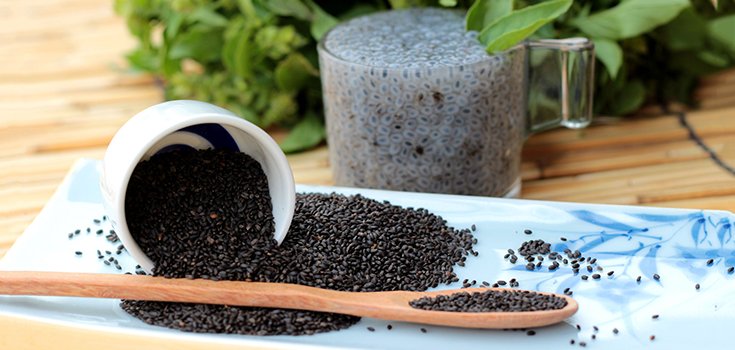11+ Reported Health Benefits of Basil Seeds

Basil smells and tastes sweet, and it’s also highly nutritious. For example, 1/4 cup of chopped basil gives you 31% of your daily vitamin K needs – so it’s a great addition if you’re lacking in that vitamin. (Check out these vitamin K deficiency symptoms if you aren’t sure.) Now, basil seeds are emerging as one of the newest superfoods, and if you’re not into the taste of chia seeds, basil seeds can easily replace them or be used alongside them. Want to know some of the reported health benefits of basil seeds? Keep on reading.
Basil seeds have traditionally been used in Ayurvedic and Chinese medicine; and while there isn’t a lot of research backing the various health claims for the seeds, the West is starting to catch on that they might be a healthy addition to one’s diet.
The seeds that are used for eating come from the sweet basil plant, Ocimum basilicum. It also goes by the names great basil and Saint-Joseph’s-wort. This species is different from the holy basil plant, Ocimum tenuiflorum, known as tulsi. The leaves and oil of the holy basil plant have been utilized in Ayurvedic medicine for a host of purposes, but not typically the seeds.
Sweet basil seeds and chia seeds are about the same size, but basil seeds are primarily black and tear-shaped. Chia seeds are a mottled grey and brown color with a more rounded shape.
Like chia seeds, sweet basil seeds take on a gelatinous texture when soaked in water. Many Asian countries use sweet basil seeds to thicken drinks and as a health supplement.
Potential Health Benefits of Basil Seeds
Let’s take a look at the purported health benefits of eating sweet basil seeds. Some of these benefits are difficult to back up with scientific literature. For now, though, here is what others are reporting, as well as some benefits backed by limited evidence (we will later provide a piece on basil with the available research to back up the touted benefits):

- 1. They reportedly have antioxidant, antibacterial, antiviral, anticancer, antispasmodic, and antifungal properties.
- 2. Basil seeds may aid in regulating blood sugar in people with type 2 diabetes.
- 3. The fiber in the outer coat of sweet basil seeds that have been soaked has a laxative effect. The seeds can also be used to alleviate flatulence, stomach cramps, and indigestion.
- 4. The fiber in basil seeds makes you feel fuller and therefore may aid in weight loss.
- 5. Basil seeds have traditionally been used to treat coughs, colds, flu, and asthma.
- 6. Eating basil seeds seem to have mood-boosting properties that can help improve depression, stress, mental fatigue, and migraines.
- 7. When crushed into an oil, basil seeds can be used as a treatment for skin infections, cuts, and wounds.
- 8. Researchers in Thailand found that sweet basil seeds can be used to lower people’s cholesterol levels.
- 9. The antibacterial properties of basil seeds reportedly make them useful for the treatment of bladder infections and vaginal infections. [1]
Other health benefits of basil seeds have also been reported:
- 10. The vitamin K, protein, and iron in sweet basil seeds can help keep hair shiny and healthy. It has even been known to help prevent hair loss and baldness.
- 11. Basil seeds act as a coolant for the body, and are often used in cold drinks, such as nimbu pani, rooh afza, falooda, and sherbet, to lower body temperature.
Pregnant mothers should avoid eating sweet basil seeds, however, because they lower estrogen levels. [2]
Basil seeds can be eaten in a variety of ways and can always be used to replace chia seeds in recipes.
It’s best to soak basil seeds for at least a couple of hours before using them to ensure their digestive enzymes are fully released.
Here are a few suggestions for using basil seeds:
- Add them to coconut milk, teas, fruit juices, or other drinks
- Blend them into smoothies
- Sprinkle them on salads
- Mix them into cheeses or sauces
- Use them in desserts in place of tapioca or other thickeners
- Mix them into yogurt and fruit
Be careful putting them in drinks, though, especially beverages intended for children, as they could choke on the seeds.
Want to know more about sweet basil? Check out another post of ours by clicking the previous link. And remember to let us know what you know about the health benefits of basil seeds in the comments below.
Sources:
[1] Care2
[2] Gyanunlimited
